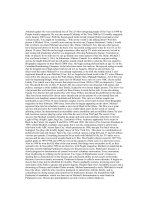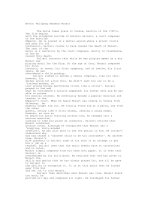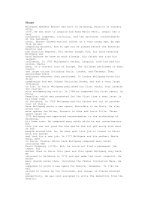breakspeare j. mozart (1902)
Bạn đang xem bản rút gọn của tài liệu. Xem và tải ngay bản đầy đủ của tài liệu tại đây (5.72 MB, 340 trang )
*
TH»
•
MA.5
T
HP-
jj/
\V
MU9ICIANJ
^
CORNELL
UNIVERSITY
LIBRARY
MUSIC
Cornell
University Library
ML 410.M93B82
Mozart,
3 1924
017 093
562
Cornell University
Library
The original of this book is in
the Cornell University Library.
There are no known copyright restrictions in
the United
States
on the
use
of the text.
/>
FREDERICK
J.
CROWEST
All rights
reserved
^
^
v\"
Mozart
By
Eustace
J.
-B^eakspeare
Author of
'
Essays
on
"
Musical Esthetics
"
&c.
With
Illustrations
and Portraits
London:
J.
M. Dent
&
Co.
New York : E.
P.
Button
& Co.
1902
Of
the few
noteworthy
treatises
relating
to Mozart
and
his work
that are accessible to the
English reader, the
most important
is
far
too bulky for ordinary
requirements.
In this work I have
aimed at both interesting and
informing
the reader
:
in the first
place, by a summary of
the great master-musician's
life-story; and, nextly,
by
some account of
his chief and (in their respective classes)
variedly representative compositions.
It has been my
care throughout to make the style of treatment
as agree-
able—and,
therefore, as untechnical and non-academical
—as
possible.
As
regards opinion, I claim to have been independent
of
previous
labourers in
this
field.
In
all
matters of
historical and biographical fact, one could not possibly
treat Mozart at all now, as their
subject, without
owing
much to the
splendid effort of the late
Otto
Jahn.
Jahn,
however, was strictly an amateur in music
—
certainly of the best and most
enlightened
type; and,
conscientious Teutonic
savant
as he
was,
it
was perhaps
only to be
expected (though none the less regrettable)
that the vast
material he had to deal with
should
be
unloaded, so
to speak, without
much concern for
artistry in literary
shapirjg and presentation. His critical
pronouncements are
admirably sound and
clear
;
but they
were
bound to be
personal
:
for the
requisite data
I
have
had
perforce to go to
Jahn
very
often
;
but
for whatever
V
Preface
aesthetic
"
views
"
and
"
sentiments,''
general or
particular,
here
pronounced, I may accept
the full responsibility.
It is
by
special permission of the
administration of
the
Salzburg
Mozart Museum (who
reserve all rights of
repro-
duction)
that the six pictures
referred thereto
in the list
of
illustrations
have been allowed to be
reproduced
for
this
work.
Br.
Birmingham,
July
1902.
Contents
PAGE
BIOGRAPHICAL
. .
i
MOZART: THE
MUSICIAN.
91
MOZART: THE MAN
228
Appendix I.
250
Appendix
II.
252
Appendix
III.
253
Appendix IV. 257
.Appendix V.
263
Appendix VI.
269
Appendix
VII.
.
293
of
Illustrations
Salzburg,
Birthplace
of
Mozart,
from
the
Kreuzberg
{Photogravure)
.
. Frontispiece
Portrait of
Mozart
at Six Years
of Age, in
a
Gala
Dress given him
by the
Empress Maria
Theresa
(Photogravure) .
. .
facing
8
By
permission of the Salzburg
Mozart Museum
Portrait
of Mozart at the Age
of Fourteen
{Jrom
an engraving by H. Adlard
of
a painting
by Battoni)
facing
36
By permission of the Executors of the late
Professor
John
Ella
Facsimile of
a Portion
of a Letter written
BY
Mozart on the Death
of his Mother
.
53
Mozart's
"
Zauberflote
"
Cottage
.
.
facing
84
By permission of the Salzburg
Mozart Museum
Portrait
of Mozart
(Jrom
an engraving
in
1793
by C.
Kohl) .
.
. .
facing
148
Illustrations
PAGE
Room
in
which
Mozart was born .
.
facing
176
By
permission
of the Salzburg Mozart Museum
Portrait
of Mozart, painted at Vienna,
1770,
WHEN
about Fourteen Years of
Age
facing
210
By permission of
the Salzburg
Mozart
Museum
Facsimile
of
First Page
of "Das Veilchen"
. 226
Portrait
of Mozart at
the Age
of
Eleven
(^from
the
original by
T.
Helbling) .
facing
234
By
permission of
the Salzburg Mozart Museum
Portrait
of
Constance
Mozart nh
Weber
{from
a
painting, in
1802,
by
Hans
Hansen) .
facing
238
By permission
of the
Salzburg Mozart
Museum
Biographical
It was in the
old,
picturesquely
situated
city of Salz-
burg,
snugly
esconced by the flowing Salzach, with the
twin heights
of the
Monchsberg and the Capuzinerberg
guarding the
valley
between, that first saw the light, on
the
27th
January,
of
the year
1756,
an
infant
who had
bestowed
upon him, the
day
following,
the
rather
pedantic,
unwieldy string of baptismal
names,
—
Johannes-
Chrysostomus-Wolfgangus-Theophilus. The parents of
this
child were
Johannes
Georg Leopold Mozart, and his
wife Anna
Maria {nie Pertl,
or
PertUn)
;
the said Mozart
being one of
the musicians in
the
service of the ruling
prince-archbishop
of Salzburg and its
province.
The
Mozart
family,
so
far back as can be
traced, belonged
to
Augsburg
1
; and
J.
G.
Leopold's father
(Johann
Georg, the
elder) was
a
bookbinder
—
the family trade it would seem
—of
that city.
But Leopold had early to
shift for
himself; and
his two younger brothers
appear
to
have
come
ofif
much the best—if there was
no actual defraud-
ing
of the
elder—in the settlement of
family affairs, upon
the
old
bookbinder's death.
'
In which place
they appear to
have
settled at
the end of the
sixteenth century.
One, Anton Mozart, artist, is
mentioned by P.
V.
Stetten. See
"Genealc^cal
Table
of
the
Mozart Family,"
Appendix
I.
Mozart
Leopold,
who
had early displayed a quick
intelligence,
along with
a
special aptitude for music, had
fortunately
attracted the notice
of the Benedictine fathers
of
St
^j,
Ulrich, in Augsburg. The kindly monks
had
V
given him much
valuable instruction
and
^
help
J
so
that when, eventually,
he
betook
himself to Salzburg,
in
order to study jurisprudence,
at
the University of that city, it was with
a good
endow-
ment —in at least
mental,
moral, and artistic
respects.
But music seems very soon
to
have
ousted
law in the
affections and
life plans
of Leopold Mozart. Compelled,
in the first instance, to seek some practical
means of
sub-
sisting, he
becomes valet to
count Thurn (who was also
a canon
of the Cathedral).
All the
time
assiduously
prosecuting his musical studies, he
is at length offered
a
permanent post in the capella
(or private orchestra) of
the
prince-archbishop.
He was an admirable
violinist,
and in
course
of time he was made orchestral
director.
As a
composer he was
most industrious,
among his
numerous works figuring six trios,
thirty
serenades, three
masses,
symphonies for
orchestra, and
a variety of
pieces
for harpsichord, organ, etc. An
orchestral
piece,
of
what
would now be called the
"descriptive"
kind
—
"
Musikalische Schlittenfahrt
"
(or Musical
sledge-drive)
became
especially popular.
But
Leopold Mozart's
mag-
num
opus was
his
"Violin
School"
("
Versuch
einer
griindlichen Violinschule
")
—a
very
sound,
thorough
book
of
its kind,
and which, for
many
years, was
esteemed
as
the
classic
manual for
violin
students
—
a
forerunner,
indeed,
of
the more modern
"Spohr."
In
the year
1747
(21st
November)
Leopold
—
now
established
for
good
in the
household
of
the
priestly
His
Precocity
sovereign
of Salzburg
—
^
took home his
newly
-wedded
wife
to their modest apartments in the
old town.
Their
first child
was a girl whom they named
(transposingly)
after
the
mother, Maria Anna, but more
commonly
called
"Nannerl."
Five
other children
they had that
died in
infancy. The
httle girl, Maria Anna
(or Marianne,
as
her
name became more often written)
showed
a re-
markable inclination for music, and she would
naturally
hear
much of it
from
her
father
and his
musicianly
colleagues. So that
when her infant
brother
appeared
upon the scene—
half-way in her fifth
year,
she had
already made
much progress at the
harpsichord,
under
the
father's enthusiastic and
loving
tuition.
In this
musical atmosphere
the
inborn talent
of an
eager,
impressionable
child, would naturally
become
quickly
aroused.
The minuets which father
and sister
play
together have
an
especial
charm for this
open
infantine ear;
and it
is not long
ere we find little
Wolfgang
—
with
possibly some slight promptings
by
papa,
in respect of
formal
treatment
—making an
inde-
pendent
essay at
the
composition of such
agreeable
little
pieces. It
had not,
of course, required
much time
for the
zealous
father to
note
the
musical aptitude
of
his
little son
;
and
the
latter has
barely turned
„.
his
third
year when
the
already wonder-
ing
papa takes
him
into
charge, and super-
^
^
'
It
was in 1278
that
the ruling
archbishops
of
Salzburg had
become
elevated to
the
rank
of
imperial princes,
by
Rudolph
of
Hapzburg.
The
archiepiscopal
see was,
however, secularised in
1802,
at
the Peace
of
Lun^ville
;
and, at the present day, the old
archbishopric
(the
city of
Salzburg
with
its
surrounding domain) has
become
an
Austrian
"crownland."
Mozart
intends
carefully Wolfgang's fingering
of these minuets,
with
whatever other necessary
musical gymnastic, upon
the harpsichord. In the
"
Mozart Museum
"
at Salzburg,
among the relics there preserved, is the identical book
containing
the minuets
in
question, and
in which
same
book we have certain notes made
by
the
proud parental
tutor
;
such as (at end of the 8th minuet) :
"
The pre-
ceding minuets were learnt by Wolfgangerl in
his fourth
year
"
; and,
further on,
"
This minuet
and
trio W.
learned in
half
an
hour,
on 26th
January,
1761,
the
day
before his fifth birthday, at half-past
nine at
night."
And, at
length,
papa
writes
down the little musician's
own
original attempts, as before mentioned,
and appends the
following certificate to
No.
i of
such compositions
:
"
By
Wolfgang
Mozart, nth May,
1762."
(And it is in
this
same book that
the youthful
Mozart
pens his first
more
important compositions, the Sonatas,
published
in
1763.)
The
child Mozart
was
of an
exceedingly
affectionate,
tender disposition,
full of
love and respect
for his
parents
and
sister.
"
Next to God comes
papa," he
would
often
say. He
was of a cheerful nature,
easily
impressed,
how-
ever, and by
turns very serious
and
reflective.
At
one
time
it almost seemed as
if
Nature
had
intended
him
for
a
mathematician. We read of him
covering
walls,
tables, etc.,
with figures and numerals
; but
once
the
musical
art
exerts its fascination,
we hear
little
or
nothing
more of these
early excursions
into the
drier
domains
of
absolute
science. As court-trumpeter
Schachtner
testified
(in a
letter addressed to Marianne,
after
her
brother's
death),
replying to a
question
raised
as to
the
young
Mozart's
favourite amusement in
childhood,
apart
from
music :
"
Nothing
can be
stated on
this point,"
he
re-
First Public
Appearance
marks,
"
for
as soon as
he began to
occupy
himself
with
music, all
inclination for other
things was
as dead in him."
Along
with his
study of the harpsichord,
young
Mo2art
had
also
busied hiinself with
the violin. An instrument
(a
"kit,"
as we at times dub these
fiddles en petit) had
been
early
presented to him;
and he appears to have
occupied
himself
therewith, more
or less secretly,
until
a
considerable
proficiency is attained, and
he
is
able
still
further
to
astonish
the home circle. Upon a
memorable visit
made by
Wentzl,
skilled violinist, with
one or
two other musical friends, for
the purpose
of
rehearsing
certain pieces, the juvenile Wolfgang presses
his father earnestly
to be allowed to take part therein,
and it is only upon
his persistent demand that papa
Leopold accords permission for
him "to play very
softly
with Herr Schachtner," otherwise
to be
expelled
the room. To
the company's great surprise, it is dis-
covered that the
young
fiddler can perfectly render, at
sight, not
only
a second (and subordinate) part, but can
also achieve the music for the leading instrument. No
wonder, then, that Leopold Mozart's
gifted
son early
becomes the
"
talk
"
of Salzburg
!
It appears to have been
customary,
at the college-
school (or "Gymnasium," as
it was called) of Salzburg,
to close the educational
year with a performance of some
dramatic piece in
Latin, set to music. In
p-
fj.
i/
1761,
a
Latin comedy, "Sigismundus Hun-
"
garise Rex"
—
with music by
Eberlin,
the
-^"
court organist
—was
selected;
and
little Wolfgang
was
chosen as
one
of the
choristers. There
were some
150
young
people
herein
engaged as actors and
singers;
and
this event is notable
as the first of
Mozart's ap-
Mozart
pearances in public.
There
was a
representation
of the
play
on the ist September, and
again on the
3rd
of
the same
month; our little
chorister would be
about
five
and
a
half
years old at
this time.
Naturally enough, the elder
Mozart, with two
extra-
ordinarily-gifted
children to
exhibit
—
and not
to
speak
of
his
own
attractions
as
virtuoso—had, by
this
time,
formed
the design
of
taking his
family
"
on tour,"
permis-
sion
first
obtained, of course,
from his
master, the
arch-
bishop.
With all his energy and
industry,
Leopold
Mozart
could, at
Salzburg, not expect to
make
much
addition,
at any time, to his already
fixed and
meagre
salary
at the archiepiscopal court.''- Rumours,
too,
had
begun to
flow
far
and wide of the
phenomenal
musical
ability of
the boy, especially ; and Leopold
doubtless
felt it
almost as
a
duty to
show
off his children's
perform-
ances to newer,
and more
profitable,
circles.
Accord-
ingly, in the
early days of
1762,
the entire Mozart
family
jp
,
.
(husband
and
wife, along with the two
,
^
.
,
children)
set out
for Munich, where
was
the
court of the elector of Bavaria. They stayed
some three
weeks away; Wolfgang
played
before
the
elector;
and Leopold Mozart was
so far encouraged by
the
results of this initial
undertaking as to apply for
"leave of
absence"
for
a second tour. There appear,
however,
to be no records extant of this early
Munich
visit. Leopold, an admirable
correspondent,
by
the
way,
'
Fees for musical tuition
ruled absurdly low. In
1778,
the
Grafin
(Countess)
v.
Walls
—
sister
of the archbishop—was paying
Leopold
Mozart for lessons given to her two eldest
daughters, 1 ducat
(8s.) for
12 lessons! Marianne taught the
two
younger,
daily,
for
;^i
per
month
!
Vienna
and
the
Imperial
Family
would
have
the family
with him,
and
so we are
deprived
of
such
"letters
home" as
became afterwards
sent
to
one
or other
left
behind,
and which supply
much
of the
Mozartean
data for
us.
(^)
Leopold,
encouraged
by this first
essay,
obtains leave
of
absence
for
a
second tour,
to extend
"till
Advent."
A start is
made on the 19th
September,
1762,
and Vienna
is
reached
at length. But, on
the
way,
the
princely
bishop
of Passau
detains the party,
and, after listening
to the little
Wolfgang,
"
deals
out
a
whole
ducat,"
as a
token of
his appreciation
!
Be
it said here, that
we shall
not
profess
to give the complete
itinerary of this
and
future
tours of
the young musician,
unless marked
by
some special incidents
or performances,
as such can hardly
have
much interest to the
modern reader. That
the
little
virtuoso played before this or
that grandee,
was
overwhelmed
with
presents,
until, as Leopold „.
,
XV
J
4. «
i-
Vienna
and
some time afterwards wrote, "an
entire ,
.
. ,
shop" might have been opened with
the
K
,
swords,
laces,
shawls, snuff-boxes, etc,
(though,
as
the prudent
papa adds, "as to money, it is
rare enough
!
"),
much of this may
be taken as under-
stood, at the outset. On this particular
journey,
the
party went by boat down
the
Danube, calling
at
Ybbs.
Here
the young
Mozart played
on the
organ
at the
Franciscan church,
to
the delight of the fathers. And
on reaching the custom-house at Vienna,
we
learn that
the boy
so charmed
the
official
in charge with his violin-
playing
as to
"
clear
"
the whole party speedily.
The empress Maria Theresa, already apprised
of the
![J. T. Molloy – Vocabulary Puzzles [Wiley, 2007]](https://media.store123doc.com/images/document/13/ce/vy/medium_vyn1387519668.jpg)








